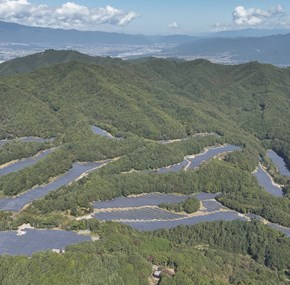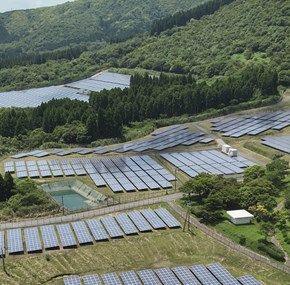France – between nuclear and renewables
The French government has laid out ambitious plans to massively expand its renewable energy production in the next decade. The plan will mean closing coal-fired power plants. However, the country has put the brakes on its plans to phase out a number of nuclear reactors. This approach risks making the transition to renewable energy more expensive to French consumers, warns our expert.
It is impossible to talk about energy in France without mentioning nuclear power. Power from France’s 58 nuclear power plants accounts for a huge 71% of the French energy mix. July 2018, however, was a grim month for nuclear energy in France.
On July 25, the French utility Electricité de France (EDF) announced further delays to its construction of the Flamanville 3 reactor in Normandy. The project, which began in 2007, has been delayed numerous times, and up until July it had been scheduled for fuel loading in 2018 and full production in 2019. But due to faulty welding, the reactor will not be ready until at least the second quarter of 2020.
To make matters worse, the cost of the reactor has increased by a further €400 million (USD $467.1 million) making the total cost of the reactor a staggering €10.9 billion.
But those hoping that the ballooning costs and perpetual delays would motivate France to end its dependency on nuclear power were soon disappointed.
Nuclear energy - a hot topic in France
When the French government presented its new energy strategy, it had abandoned a previous target for reducing nuclear dependency. The previous target was to cut nuclear power’s share of the energy mix from 71% to 50% by 2025. This target has now been postponed by at least a decade to 2035.
That the role of nuclear energy is a deeply sensitive issue in French politics became clear in August 2018, when the high-profile environment minister, Nicolas Hulot, suddenly resigned from government. He cited frustration with the government’s slow progress on climate change as one of the reasons behind his resignation.
At the heart of this disagreement lie different views on nuclear energy. Should France reduce its dependence on nuclear as quickly as possible? Or is nuclear the prerequisite for the transition to an energy system based on renewables? In the internal power struggle in the French government, the latter view seems to have prevailed.
But even after Hulot’s resignation, the debate continued. A report from France’s environment ministry in December 2018 clearly concluded that France would save €39 billion by moving away from nuclear and instead investing heavily in renewable energy production, imports and storage solutions.
- France is in a league of its own, in terms of the role nuclear energy plays in its energy system. In the past, nuclear energy has indeed delivered cheap electricity to consumers as well as being a source of jobs. But renewable energy technologies are rapidly developing, and nuclear energy will not be able to keep up, says Grégoire Derville, Technical Director of Obton’s subsidiary in France, Coruscant Développement.
Making room for wind and solar
For the time being, France seems to be adopting the two-pronged approach of nuclear and renewable energy.
This means that nuclear energy will continue to be France’s first choice power source for the foreseeable future while the country simultaneously expands its renewable energy production to gradually replace fossil-based energy production (all coal power plants will be closed by 2022 according to plans).
The proposed expansion of renewable energy looks impressive:
Mainly by boosting solar and wind energy production, France intends to more than double its renewable energy production by 2028. From 48.6 GW at the end of 2017 to 113 GW by 2028.
Solar capacity is set to grow the most. The 7.7 GW capacity at the end of 2017 will grow to 40 GW by 2028 – a more than fivefold increase in installed capacity.
Difficult road ahead
To achieve these goals, France needs to add 2-3 GW of solar capacity every year until 2028. This has led some observers to worry that the country may not be able to deliver on that rate of expansion.
- The main obstacle to expanding renewable energy production is the frequent change in the regulations governing the area, says Jean-Luc Leloup, Managing Director of Coruscant Développement. He adds that companies who want to succeed in the French solar market need to work closely with local partners to overcome any administrative obstacles.
This is why Obton is developing solar PV projects through its French subsidiary, Coruscant Développement.






